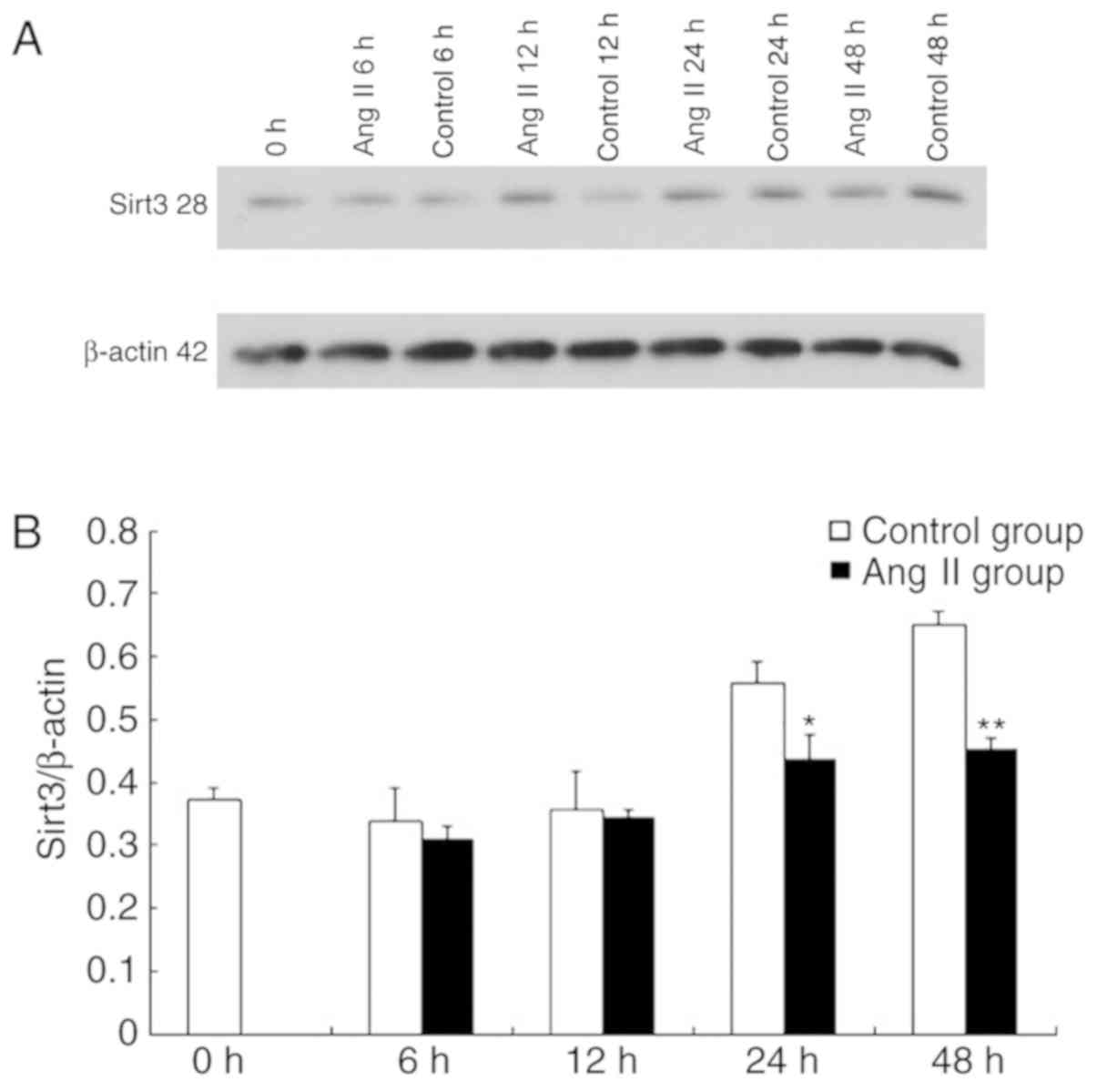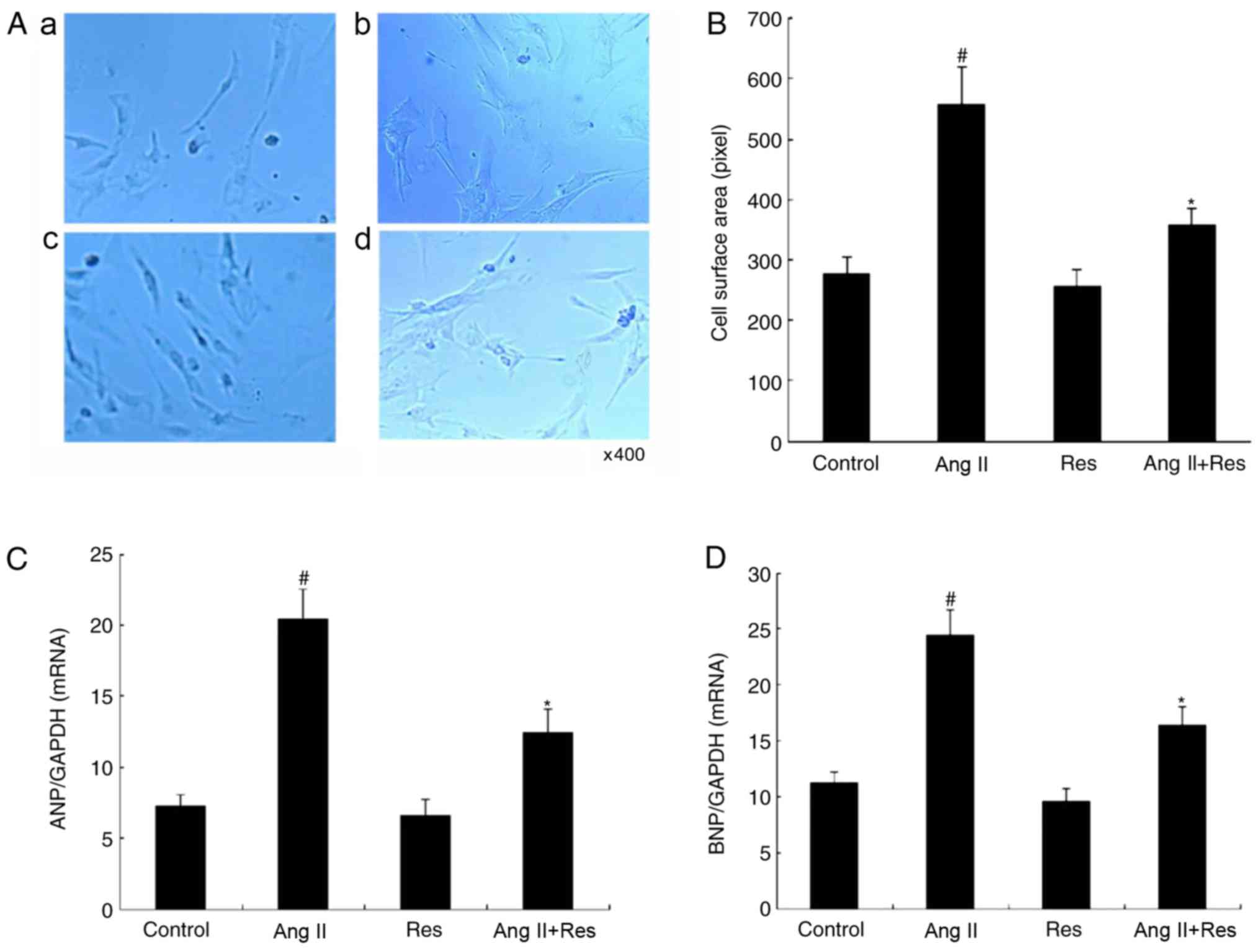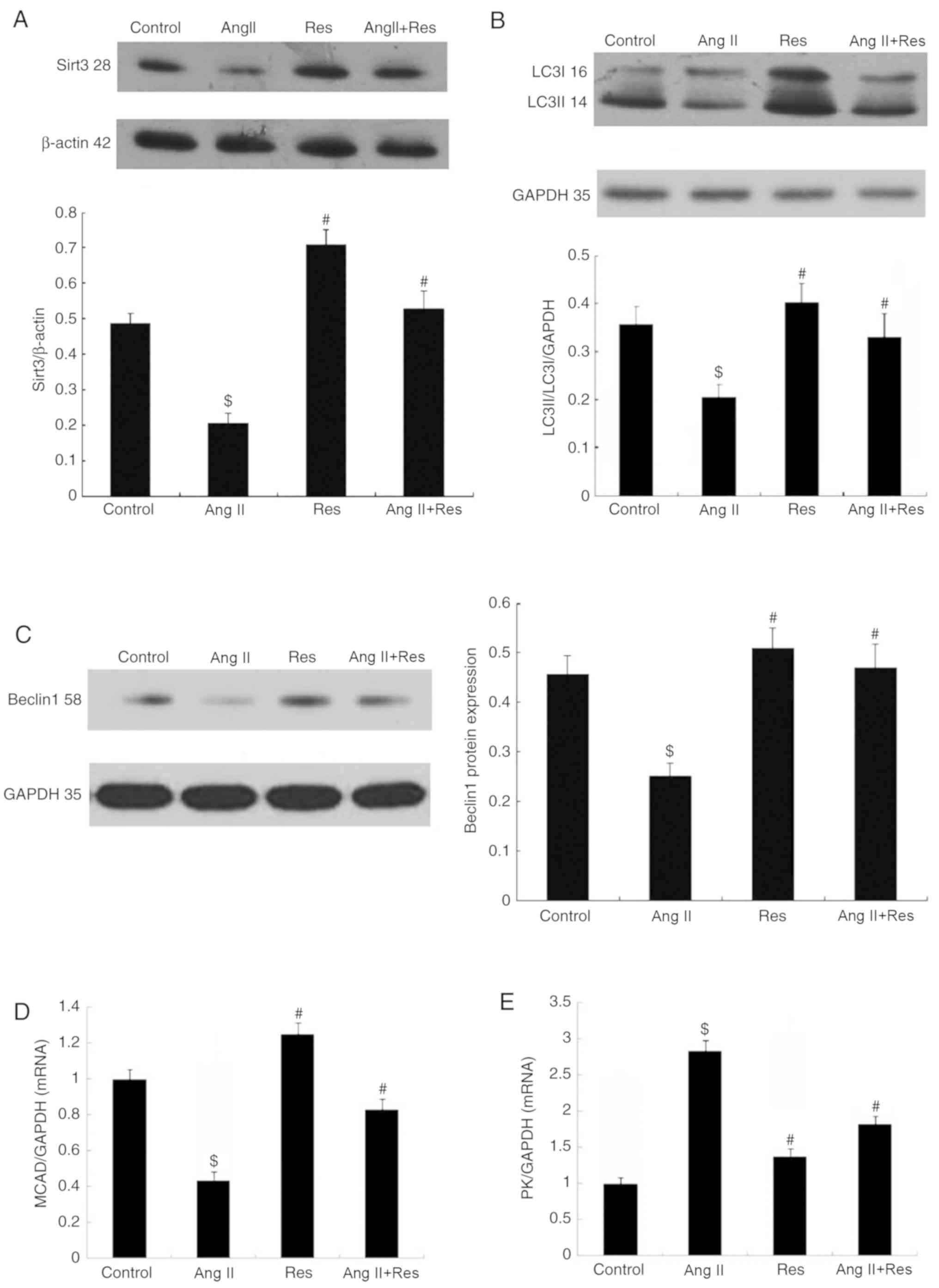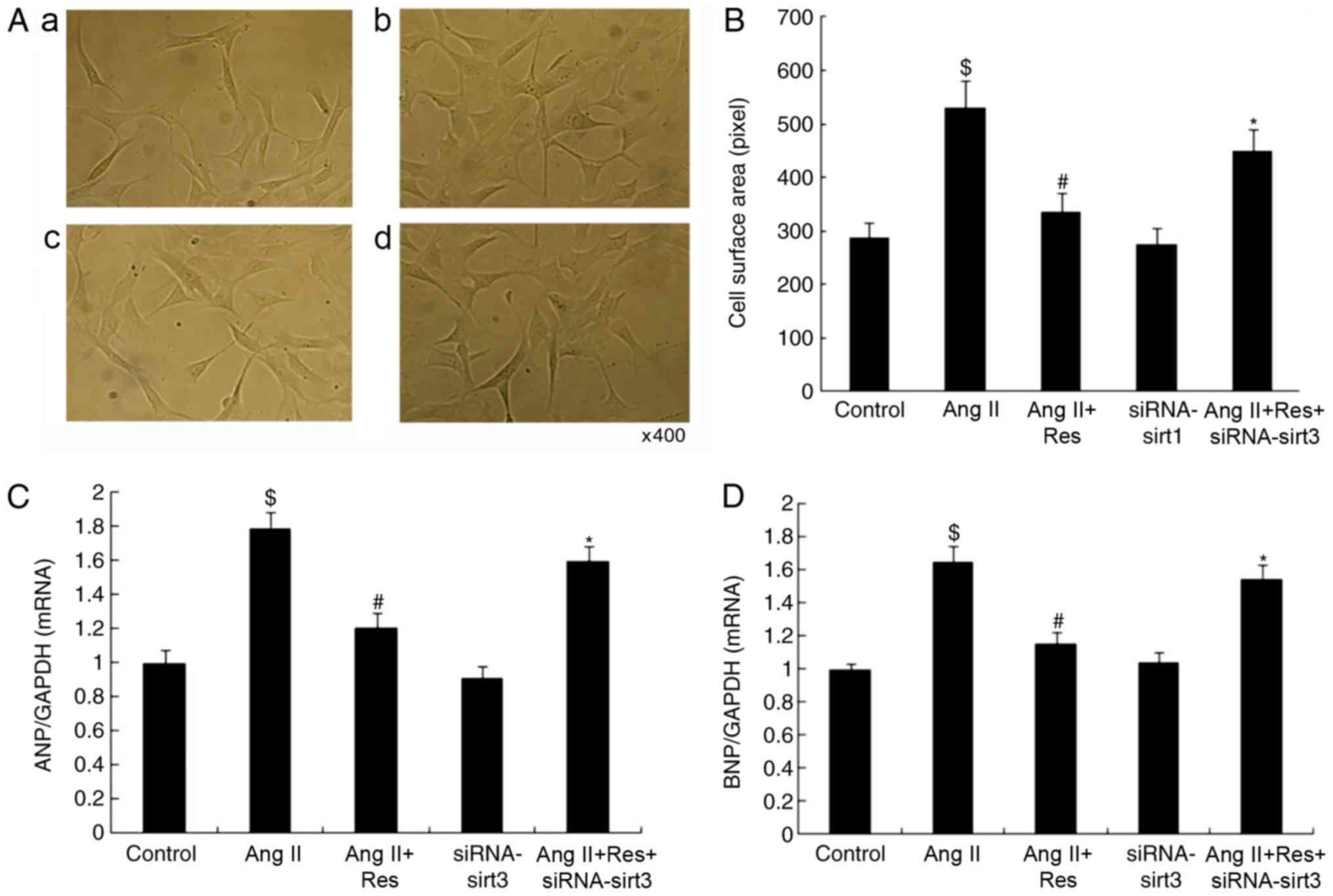|
1
|
Vanberg P and Atar D: Androgenic anabolic
steroid abuse and the cardiovascular system. Handb Exp Pharmacol.
195:411–457. 2010. View Article : Google Scholar
|
|
2
|
Ruppert M, Korkmaz-Icöz S, Loganathan S,
Jiang W, Lehmann L, Oláh A, Sayour AA, Barta BA, Merkely B, Karck
M, et al: Pressure-volume analysis reveals characteristic
sex-related differences in cardiac function in a rat model of
aortic banding-induced myocardial hypertrophy. Am J Physiol Heart
Circ Physiol. 315:H502–H511. 2018. View Article : Google Scholar : PubMed/NCBI
|
|
3
|
Sugden PH and Clerk A: Cellular mechanisms
of cardiac hypertrophy. J Mol Med (Berl). 76:725–746. 1998.
View Article : Google Scholar : PubMed/NCBI
|
|
4
|
den Besten G, van Eunen K, Groen AK,
Venema K, Reijngoud DJ and Bakker BM: The role of short-chain fatty
acids in the interplay between diet, gut microbiota, and host
energy metabolism. J Lipid Res. 54:2325–2340. 2013. View Article : Google Scholar : PubMed/NCBI
|
|
5
|
Chatham JC and Young ME: Metabolic
remodeling in the hypertrophic heart: Fuel for thought. Circ Res.
111:666–668. 2012. View Article : Google Scholar : PubMed/NCBI
|
|
6
|
Shen W, Asai K, Uechi M, Mathier MA,
Shannon RP, Vatner SF and Ingwall JS: Progressive loss of
myocardial ATP due to a loss of total purines during the
development of heart failure in dogs: A compensatory role for the
parallel loss of creatine. Circulation. 100:2113–2118. 1999.
View Article : Google Scholar : PubMed/NCBI
|
|
7
|
Ingwall JS: Energy metabolism in heart
failure and remodelling. Cardiovasc Res. 81:412–419. 2009.
View Article : Google Scholar : PubMed/NCBI
|
|
8
|
Blander G and Guarente L: The Sir2 family
of protein deacetylases. Annu Rev Biochem. 73:417–435. 2004.
View Article : Google Scholar : PubMed/NCBI
|
|
9
|
Giralt A and Villarroya F: SIRT3, a
pivotal actor in mitochondrial functions: Metabolism, cell death
and aging. Biochem J. 444:1–10. 2012. View Article : Google Scholar : PubMed/NCBI
|
|
10
|
Sundaresan NR, Gupta M, Kim G, Rajamohan
SB, Isbatan A and Gupta MP: Sirt3 blocks the cardiac hypertrophic
response by augmenting Foxo3a-dependent antioxidant defense
mechanisms in mice. J Clin Invest. 119:2758–2771. 2009.PubMed/NCBI
|
|
11
|
Pillai VB, Sundaresan NR, Kim G, Gupta M,
Rajamohan SB, Pillai JB, Samant S, Ravindra PV, Isbatan A and Gupta
MP: Exogenous NAD blocks cardiac hypertrophic response via
activation of the SIRT3-LKB1-AMP-activated kinase pathway. J Biol
Chem. 285:3133–3144. 2010. View Article : Google Scholar : PubMed/NCBI
|
|
12
|
Yue Z, Ma Y, You J, Li Z, Ding Y, He P, Lu
X, Jiang J, Chen S and Liu P: NMNAT3 is involved in the protective
effect of SIRT3 in Ang II-induced cardiac hypertrophy. Exp Cell
Res. 347:261–273. 2016. View Article : Google Scholar : PubMed/NCBI
|
|
13
|
Shintani T and Klionky DJ: Autophagy in
health and disease: a double-edged sword. Science. 306:990–995.
2004. View Article : Google Scholar : PubMed/NCBI
|
|
14
|
Dämmrich J and Pfeifer U: Cardiac
hypertrophy in rats after supravalvular aortic constriction. II.
Inhibition of cellular autophagy in hypertrophying cardiomyocytes.
Virchows Arch B Cell Pathol Incl Mol Pathol. 43:287–307. 1983.
View Article : Google Scholar : PubMed/NCBI
|
|
15
|
Nakai A, Yamaguchi O, Takeda T, Higuchi Y,
Hikoso S, Taniike M, Omiya S, Mizote I, Matsumura Y, Asahi M, et
al: The role of autophagy in cardiomyocytes in the basal state and
in response to hemodynamic stress. Nat Med. 13:619–624. 2007.
View Article : Google Scholar : PubMed/NCBI
|
|
16
|
Wang HN, Liu C, Li YH, Chen Z, Sun G, Xue
RC and Dong YG: Role of autophagy in myocardial hypertrophy induced
by angiotensin II. J Zhongshan Univ. 33:440–443. 2014.
|
|
17
|
Hindle AG, Grabek KR, Epperson LE,
Karimpour-Fard A and Martin SL: Metabolic changes associated with
the long winter fast dominate the liver proteome in 13-lined ground
squirrels. Physiol Genomics. 46:348–361. 2014. View Article : Google Scholar : PubMed/NCBI
|
|
18
|
Pi H, Xu S, Reiter RJ, Guo P, Zhang L, Li
Y, Li M, Cao Z, Tian L, Xie J, et al: SIRT3-SOD2-mROS-dependent
autophagy in cadmium-induced hepatotoxicity and salvage by
melatonin. Autophagy. 11:1037–1051. 2015. View Article : Google Scholar : PubMed/NCBI
|
|
19
|
Tong W, Ju L, Qiu M, Xie Q, Cheng Y, Shen
W, Sun W, Wang W and Tian J: Liraglutide ameliorate non-alcohol
fatty liver disease by enhancing mitochondrial architecture and
promoting autophagy through SIRT1/SIRT3-FOXO3a pathway. Hepatol
Res. 46:933–943. 2016. View Article : Google Scholar : PubMed/NCBI
|
|
20
|
Auburger G, Gispert S and Jendrach M:
Mitochondrial acetylation and genetic models of Parkinson's
disease. Prog Mol Biol Transl Sci. 127:155–182. 2014. View Article : Google Scholar : PubMed/NCBI
|
|
21
|
Marques-Aleixo I, Santos-Alves E, Balça
MM, Moreira PI, Oliveira PJ, Magalhães J and Ascensão A: Physical
exercise mitigates doxorubicin-induced brain cortex and cerebellum
mitochondrial alterations and cellular quality control signaling.
Mitochondrion. 26:43–57. 2016. View Article : Google Scholar : PubMed/NCBI
|
|
22
|
Fang Y, Wang J, Xu L, Cao Y, Xu F, Yan L,
Nie M, Yuan N, Zhang S, Zhao R, et al: Autophagy maintains
ubiquitination-proteasomal degradation of Sirt3 to limit oxidative
stress in K562 leukemia cells. Oncotarget. 7:35692–35702. 2016.
View Article : Google Scholar : PubMed/NCBI
|
|
23
|
Qiao A, Wang K, Yuan Y, Guan Y, Ren X, Li
L, Chen X, Li F, Chen AF, Zhou J, et al: Sirt3-mediated mitophagy
protects tumor cells against apoptosis under hypoxia. Oncotarget.
7:43390–43400. 2016. View Article : Google Scholar : PubMed/NCBI
|
|
24
|
Shi L, Zhang T, Zhou Y, Zeng X, Ran L,
Zhang Q, Zhu J and Mi M: Dihydromyricetin improves skeletal muscle
insulin sensitivity by inducing autophagy via the AMPK-PGC-1α-Sirt3
signaling pathway. Endocrine. 50:378–389. 2015. View Article : Google Scholar : PubMed/NCBI
|
|
25
|
Mukherjee S, Ray D, Lekli I, Bak I, Tosaki
A and Das DK: Effects of Longevinex (modified resveratrol) on
cardioprotection and its mechanisms of action. Can J Physiol
Pharmacol. 88:1017–1025. 2010. View
Article : Google Scholar : PubMed/NCBI
|
|
26
|
Chen GQ, Liu C, Zhang CX, Meng RS, Chen
BL, Xiong ZJ and Dong YG: The role of HO-1 in inhibiting cardiac
hypertrophy by AMPK. Journal of Sun Yat-sen University. 31:614–618.
2010.
|
|
27
|
Yin R, Dong YG, Li HL and Liu D: Activated
AMPK attenuates cardiac hypertrophy in rats through increasing
myocardial fatty acid oxidation. Chin J Pathophysiol. 23:1258–1262.
2007.
|
|
28
|
Livak KJ and Schmittgen TD: Analysis of
relative gene expression data using real-time quantitative PCR and
the 2(−ΔΔC(T)) method. Methods. 25:402–408. 2001. View Article : Google Scholar : PubMed/NCBI
|
|
29
|
Watson CJ, Horgan S, Neary R, Glezeva N,
Tea I, Corrigan N, McDonald K, Ledwidge M and Baugh J: Epigenetic
therapy for the treatment of hypertension-induced cardiac
hypertrophy and fibrosis. J Cardiovasc Pharmacol Ther. 21:127–137.
2016. View Article : Google Scholar : PubMed/NCBI
|
|
30
|
Lu L, Wu D, Li L and Chen L: Apelin/APJ
system: A bifunctional target for cardiac hypertrophy. Int J
Cardiol. 230:164–170. 2017. View Article : Google Scholar : PubMed/NCBI
|
|
31
|
Cooper HM and Spelbrink JN: The human
SIRT3 protein deacetylase is exclusively mitochondrial. Biochem J.
411:279–285. 2008. View Article : Google Scholar : PubMed/NCBI
|
|
32
|
Scher MB, Vaquero A and Reinberg D: SirT3
is a nuclear NAD+-dependent histone deacetylase that
translocates to the mitochondria upon cellular stress. Genes Dev.
21:920–928. 2007. View Article : Google Scholar : PubMed/NCBI
|
|
33
|
Jin L, Galonek H, Israelian K, Choy W,
Morrison M, Xia Y, Wang X, Xu Y, Yang Y, Smith JJ, et al:
Biochemical characterization, localization, and tissue distribution
of the longer form of mouse SIRT3. Protein Sci. 18:514–525. 2009.
View Article : Google Scholar : PubMed/NCBI
|
|
34
|
Shi T, Wang F, Stieren E and Tong Q:
SIRT3, a mitochondrial sirtuin deacetylase, regulates mitochondrial
function and thermogenesis in brown adipocytes. J Biol Chem.
280:13560–13567. 2005. View Article : Google Scholar : PubMed/NCBI
|
|
35
|
Li H, Feng Z, Wu W, Li J, Zhang J and Xia
T: SIRT3 regulates cell proliferation and apoptosis related to
energy metabolism in non-small cell lung cancer cells through
deacetylation of NMNAT2. Int J Oncol. 43:1420–1430. 2013.
View Article : Google Scholar : PubMed/NCBI
|
|
36
|
Bell EL, Emerling BM, Ricoult SJ and
Guarente L: SirT3 suppresses hypoxia inducible factor 1α and tumor
growth by inhibiting mitochondrial ROS production. Oncogene.
30:2986–2996. 2011. View Article : Google Scholar : PubMed/NCBI
|
|
37
|
Jing E, Emanuelli B, Hirschey MD, Boucher
J, Lee KY, Lombard D, Verdin EM and Kahn CR: Sirtuin-3 (Sirt3)
regulates skeletal muscle metabolism and insulin signaling via
altered mitochondrial oxidation and reactive oxygen species
production. Proc Natl Acad Sci USA. 108:14608–14613. 2011.
View Article : Google Scholar : PubMed/NCBI
|
|
38
|
Jacobs KM, Pennington JD, Bisht KS,
Aykin-Burns N, Kim HS, Mishra M, Sun L, Nguyen P, Ahn BH, Leclerc
J, et al: SIRT3 interacts with the daf-16 homolog FOXO3a in the
mitochondria, as well as increases FOXO3a dependent gene
expression. Int J Biol Sci. 4:291–299. 2008. View Article : Google Scholar : PubMed/NCBI
|
|
39
|
Fernandez-Marcos PJ, Jeninga EH, Canto C,
Harach T, de Boer VC, Andreux P, Moullan N, Pirinen E, Yamamoto H,
Houten SM, et al: Muscle or liver-specific Sirt3 deficiency induces
hyperacetylation of mitochondrial proteins without affecting global
metabolic homeostasis. Sci Rep. 2:4252012. View Article : Google Scholar : PubMed/NCBI
|
|
40
|
Finley LW, Haas W, Desquiret-Dumas V,
Wallace DC, Procaccio V, Gygi SP and Haigis MC: Succinate
dehydrogenase is a direct target of sirtuin 3 deacetylase activity.
PLoS One. 6:e232952011. View Article : Google Scholar : PubMed/NCBI
|
|
41
|
Ahn BH, Kim HS, Song S, Lee IH, Liu J,
Vassilopoulos A, Deng CX and Finkel T: A role for the mitochondrial
deacetylase Sirt3 in regulating energy homeostasis. Proc Natl Acad
Sci USA. 105:14447–14452. 2008. View Article : Google Scholar : PubMed/NCBI
|
|
42
|
Chen Y, Zhang J, Lin Y, Lei Q, Guan KL,
Zhao S and Xiong Y: Tumour suppressor SIRT3 deacetylates and
activates manganese superoxide dismutase to scavenge ROS. EMBO Rep.
12:534–541. 2011. View Article : Google Scholar : PubMed/NCBI
|
|
43
|
Finley LW, Carracedo A, Lee J, Souza A,
Egia A, Zhang J, Teruya-Feldstein J, Moreira PI, Cardoso SM, Clish
CB, et al: SIRT3 opposes reprogramming of cancer cell metabolism
through HIF1α destabilization. Cancer Cell. 19:416–428. 2011.
View Article : Google Scholar : PubMed/NCBI
|
|
44
|
Hallows WC, Yu W, Smith BC, Devries MK,
Ellinger JJ, Someya S, Shortreed MR, Prolla T, Markley JL, Smith
LM, et al: Sirt3 promotes the urea cycle and fatty acid oxidation
during dietary restriction. Mol Cell. 41:139–149. 2011. View Article : Google Scholar : PubMed/NCBI
|
|
45
|
Hirschey MD, Shimazu T, Goetzman E, Jing
E, Schwer B, Lombard DB, Grueter CA, Harris C, Biddinger S,
Ilkayeva OR, et al: SIRT3 regulates mitochondrial fatty-acid
oxidation by reversible enzyme deacetylation. Nature. 464:121–125.
2010. View Article : Google Scholar : PubMed/NCBI
|
|
46
|
Hirschey MD, Shimazu T, Capra JA, Pollard
KS and Verdin E: SIRT1 and SIRT3 deacetylate homologous substrates:
AceCS1,2 and HMGCS1,2. Aging (Albany NY). 3:635–642. 2011.
View Article : Google Scholar : PubMed/NCBI
|
|
47
|
Shimazu T, Hirschey MD, Hua L,
Dittenhafer-Reed KE, Schwer B, Lombard DB, Li Y, Bunkenborg J, Alt
FW, Denu JM, et al: SIRT3 deacetylates mitochondrial
3-hydroxy-3-methylglutaryl CoA synthase 2 and regulates ketone body
production. Cell Metab. 12:654–661. 2010. View Article : Google Scholar : PubMed/NCBI
|
|
48
|
Kendrick AA, Choudhury M, Rahman SM,
McCurdy CE, Friederich M, Van Hove JL, Watson PA, Birdsey N, Bao J,
Gius D, et al: Fatty liver is associated with reduced SIRT3
activity and mitochondrial protein hyperacetylation. Biochem J.
433:505–514. 2011. View Article : Google Scholar : PubMed/NCBI
|
|
49
|
Yang Y, Cimen H, Han MJ, Shi T, Deng JH,
Koc H, Palacios OM, Montier L, Bai Y, Tong Q, et al:
NAD+-dependent deacetylase SIRT3 regulates mitochondrial
protein synthesis by deacetylation of the ribosomal protein MRPL10.
J Biol Chem. 285:7417–7429. 2010. View Article : Google Scholar : PubMed/NCBI
|
|
50
|
Hafner AV, Dai J, Gomes AP, Xiao CY,
Palmeira CM, Rosenzweig A and Sinclair DA: Regulation of the mPTP
by SIRT3-mediated deacetylation of CypD at lysine 166 suppresses
age-related cardiac hypertrophy. Aging (Albany NY). 2:914–923.
2010. View Article : Google Scholar : PubMed/NCBI
|
|
51
|
Iwahara T, Bonasio R, Narendra V and
Reinberg D: SIRT3 functions in the nucleus in the control of
stress-related gene expression. Mol Cell Biol. 32:5022–5034. 2012.
View Article : Google Scholar : PubMed/NCBI
|
|
52
|
Allison SJ and Milner J: SIRT3 is
pro-apoptotic and participates in distinct basal apoptotic
pathways. Cell Cycle. 6:2669–2677. 2007. View Article : Google Scholar : PubMed/NCBI
|
|
53
|
Cooper HM, Huang JY, Verdin E and
Spelbrink JN: A new splice variant of the mouse SIRT3 gene encodes
the mitochondrial precursor protein. PLoS One. 4:e49862009.
View Article : Google Scholar : PubMed/NCBI
|
|
54
|
Shulga N and Pastorino JG: Ethanol
sensitizes mitochondria to the permeability transition by
inhibiting deacetylation of cyclophilin-D mediated by sirtuin-3. J
Cell Sci. 123:4117–4127. 2010. View Article : Google Scholar : PubMed/NCBI
|
|
55
|
Chen T, Li J, Liu J, Li N, Wang S, Liu H,
Zeng M, Zhang Y and Bu P: Activation of SIRT3 by resveratrol
ameliorates cardiac fibrosis and improves cardiac function via the
TGF-β/Smad3 pathway. Am J Physiol Heart Circ Physiol.
308:H424–H434. 2015. View Article : Google Scholar : PubMed/NCBI
|
|
56
|
Chen T, Liu J, Li N, Wang S, Liu H, Li J,
Zhang Y and Bu P: Mouse SIRT3 attenuates hypertrophy-related lipid
accumulation in the heart through the deacetylation of LCAD. PLoS
One. 10:e01189092015. View Article : Google Scholar : PubMed/NCBI
|
|
57
|
Ucar A, Gupta SK, Fiedler J, Erikci E,
Kardasinski M, Batkai S, Dangwal S, Kumarswamy R, Bang C, Holzmann
A, et al: The miRNA-212/132 family regulates both cardiac
hypertrophy and cardiomyocyte autophagy. Nat Commun. 3:10782012.
View Article : Google Scholar : PubMed/NCBI
|
|
58
|
Wang X and Su H: FoxO3 hastens autophagy
and shrinks the heart but does not curtail pathological hypertrophy
in adult mice. Cardiovasc Res. 91:561–562. 2011. View Article : Google Scholar : PubMed/NCBI
|
|
59
|
Laurent AC, Bisserier M, Lucas A, Tortosa
F, Roumieux M, De Régibus A, Swiader A, Sainte-Marie Y, Heymes C,
Vindis C, et al: Exchange protein directly activated by cAMP 1
promotes autophagy during cardiomyocyte hypertrophy. Cardiovasc
Res. 105:55–64. 2015. View Article : Google Scholar : PubMed/NCBI
|
|
60
|
Zhu H, Tannous P, Johnstone JL, Kong Y,
Shelton JM, Richardson JA, Le V, Levine B, Rothermel BA and Hill
JA: Cardiac autophagy is a maladaptive response to hemodynamic
stress. J Clin Invest. 117:1782–1793. 2007. View Article : Google Scholar : PubMed/NCBI
|
|
61
|
Kostin S, Pool L, Elsässer A, Hein S,
Drexler HC, Arnon E, Hayakawa Y, Zimmermann R, Bauer E, Klövekorn
WP, et al: Myocytes die by multiple mechanisms in failing human
hearts. Circ Res. 92:715–724. 2003. View Article : Google Scholar : PubMed/NCBI
|
|
62
|
Rawat DK, Alzoubi A, Gupte R, Chettimada
S, Watanabe M, Kahn AG, Okada T, McMurtry IF and Gupte SA:
Increased reactive oxygen species, metabolic maladaptation, and
autophagy contribute to pulmonary arterial hypertension-induced
ventricular hypertrophy and diastolic heart failure. Hypertension.
64:1266–1274. 2014. View Article : Google Scholar : PubMed/NCBI
|
|
63
|
De Meyer GR, De Keulenaer GW and Martinet
W: Role of autophagy in heart failure associated with aging. Heart
Fail Rev. 15:423–430. 2010. View Article : Google Scholar : PubMed/NCBI
|
|
64
|
Mao XB, You ZP, Wu C and Huang J:
Potential suppression of the high glucose and insulin-induced
retinal neovascularization by Sirtuin 3 in the human retinal
endothelial cells. Biochem Biophys Res Commun. 482:341–345. 2017.
View Article : Google Scholar : PubMed/NCBI
|
|
65
|
Wei T, Huang G, Gao J, Huang C, Sun M, Wu
J, Bu J and Shen W: Sirtuin 3 deficiency accelerates hypertensive
cardiac remodeling by impairing angiogenesis. J Am Heart Assoc.
6:e0061142017. View Article : Google Scholar : PubMed/NCBI
|


















